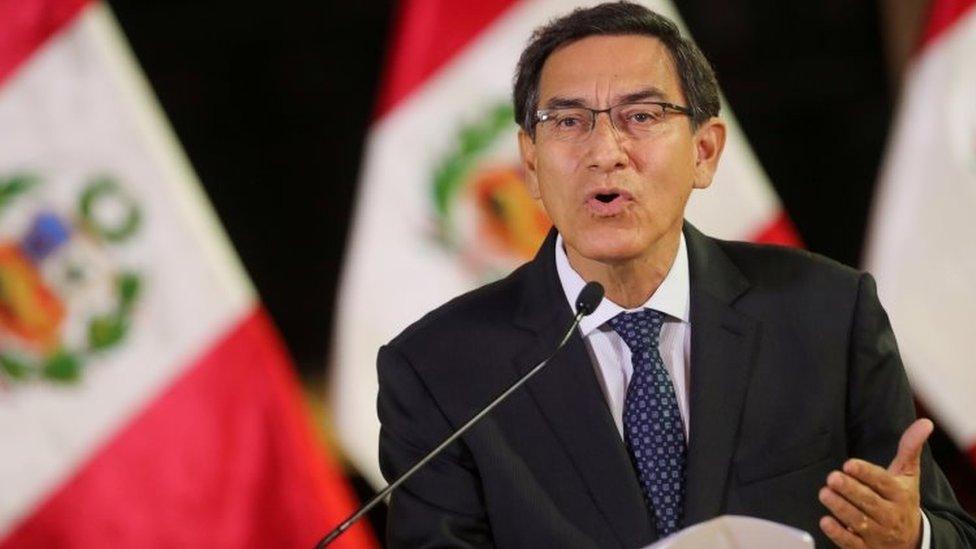From 'Porky' to goalie: Peru's presidential candidates
- Published
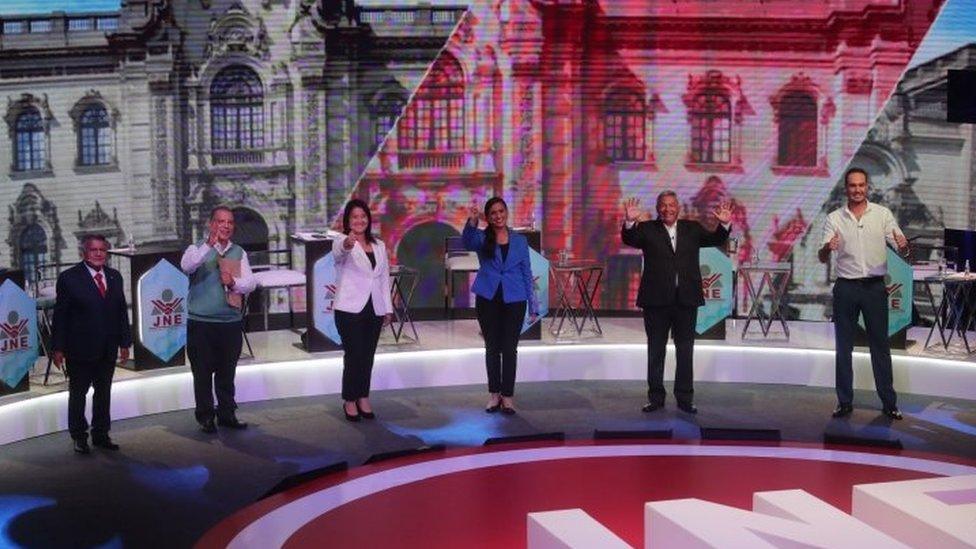
With 18 candidates in the running, three presidential debates were held to give each candidate a chance to lay out their policies
Peru's presidential contenders are nothing if not colourful. A former goalkeeper with the national football team; an ultra-conservative Catholic businessman nicknamed "Porky" after a Looney Tunes character; a populist with an anti-corruption message; and a veteran presidential contender whose father is a disgraced former head of state are among the 18 people running for the top job on 11 April.
But despite the wide choice on offer, Peruvian voters appear unenthusiastic and even the leading contenders have been struggling to muster support among a populace worn out by the devastating Covid-19 pandemic.
One recent poll by the Peruvian Studies Institute (IEP) had the top five candidates in a technical draw and none of them getting more than single-digit percentages.
Since a candidate needs to win more than 50% of the total votes to win outright in the first round, it looks highly likely that the contest will go into a run-off on 6 June.
Turbulent time
Whoever becomes president will likely face a fragmented newly elected Congress with lawmakers from at least 10 parties.
This does not bode well for the stability of a country which in recent years has seen furious feuding between its heads of state and Congress, leading to a spate of political crises.
The stand-off between the executive and the legislature came to a head in November 2020 when Peru was led by three presidents within a week.
First, Martín Vizcarra - who rose from vice-president to president when his running mate Pedro Pablo Kuczynski quit over a vote-buying scandal in March 2018 - was impeached by Congress for alleged corruption.
Peru protests spurred by President Vizcarra's impeachment
His interim replacement, Manuel Merino, lasted less than a week. He was followed by current interim president, Francisco Sagasti, who was sworn in on 17 November.
Under Peru's constitution, presidents are barred from holding consecutive terms of office, so Mr Sagasti will not be able to run for president, leaving the field wide open.
Who's in with a chance?
Yonhy Lescano, a 62-year-old populist from the Popular Action party, is the front-runner according to recent polls.
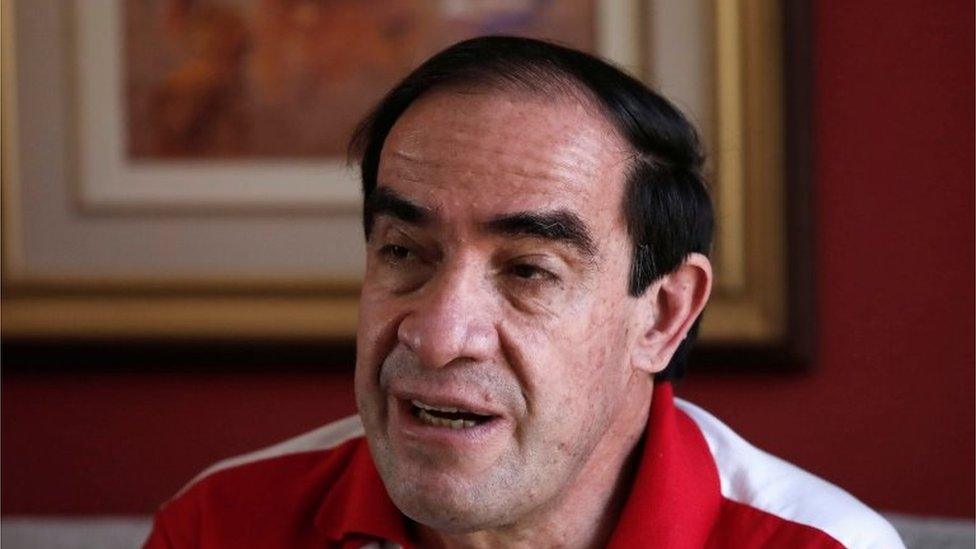
Recent polls suggest Yonhy Lescano is the frontrunner
While he holds some socially conservative views, Mr Lescano's proposed economic policies are left-leaning.
A lawyer by training, he says he wants a more equitable distribution of mining revenues in Peru, the second largest producer of copper in the world. He says he will give a tax break to small and micro-entrepreneurs and is running on an anti-corruption platform.
Close behind in the poll by Ipsos Peru was 79-year-old liberal economist Hernando de Soto, of the Go On Country party. De Soto is the founder of a Lima-based think tank, the Institute for Liberty and Democracy (ILD), which is devoted to the promotion of property rights.
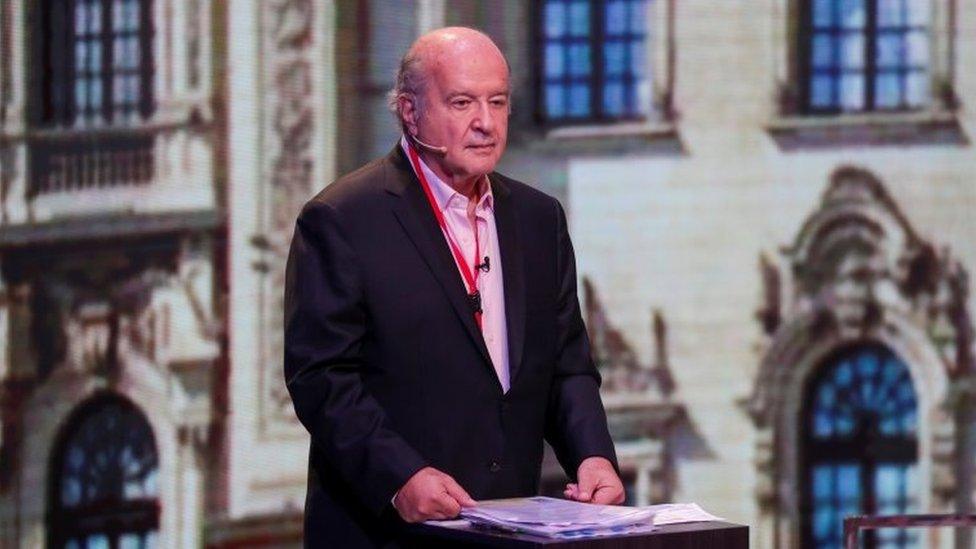
Hernando de Soto says he wants to allow private firms to play a role in Peru's vaccination programme
He was also an economic advisor to former Peruvian President Alberto Fujimori, who is serving a 25-year-sentence for human rights abuses committed during his term.
Coming third in the Ipsos poll was 40-year-old left-wing candidate Verónika Mendoza of the Together for Peru party. The anthropologist says she wants to review tax exemptions for larger firms and create a wealth tax for the super-rich.
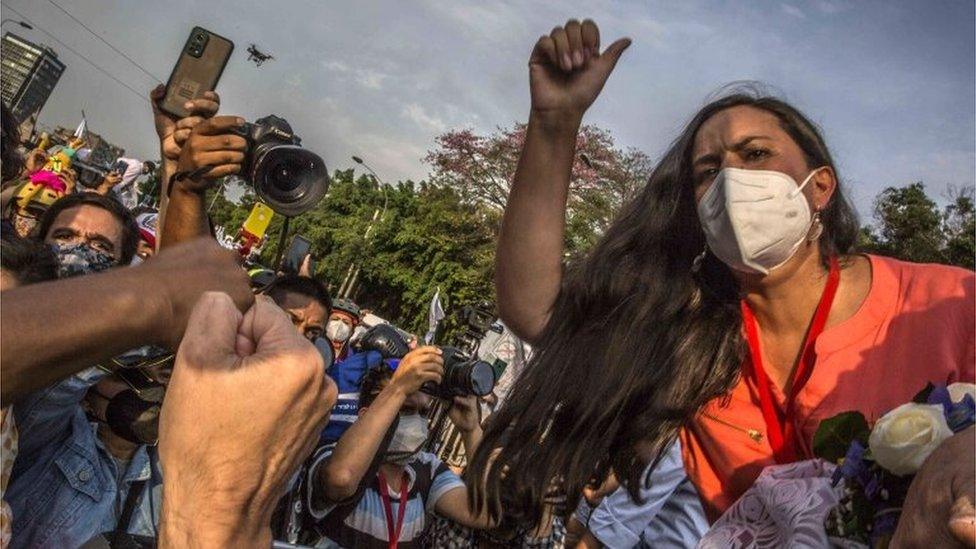
Verónika Mendoza came third in the 2016 election and wants to do better this time around
She was followed by George Forsyth, a 38-year-old former goalkeeper for Peru's national football team who is standing for the National Victory party. Mr Forsyth is trying to appeal to young voters and has proposed creating a "mining trust" to ensure royalties from mining help local communities.
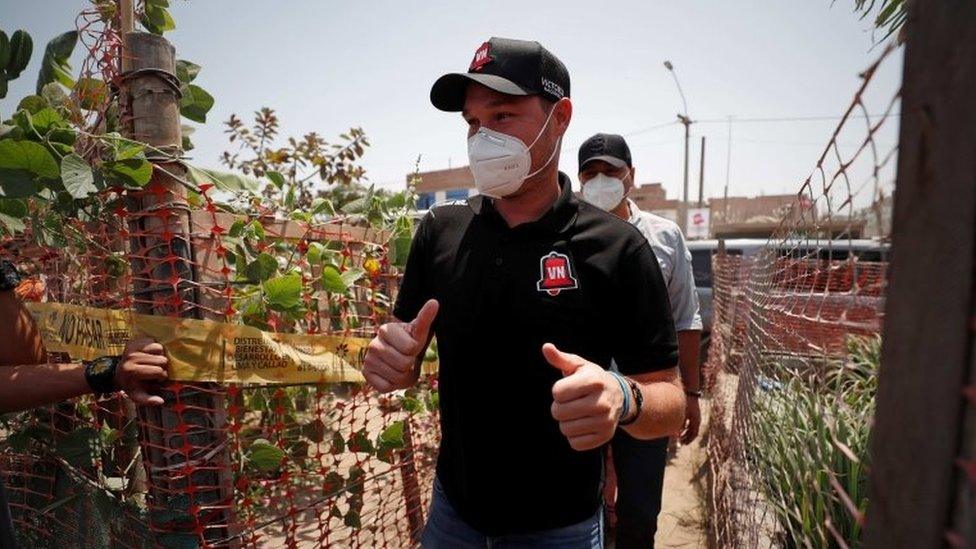
George Forsyth has been a mayor as well as a professional football player
One of Peru's best-known politicians, Keiko Fujimori, a 45-year-old former congresswoman and daughter of former President Alberto Fujimori, who represents the Popular Force Party, only had just over 9% in the Ipsos poll.
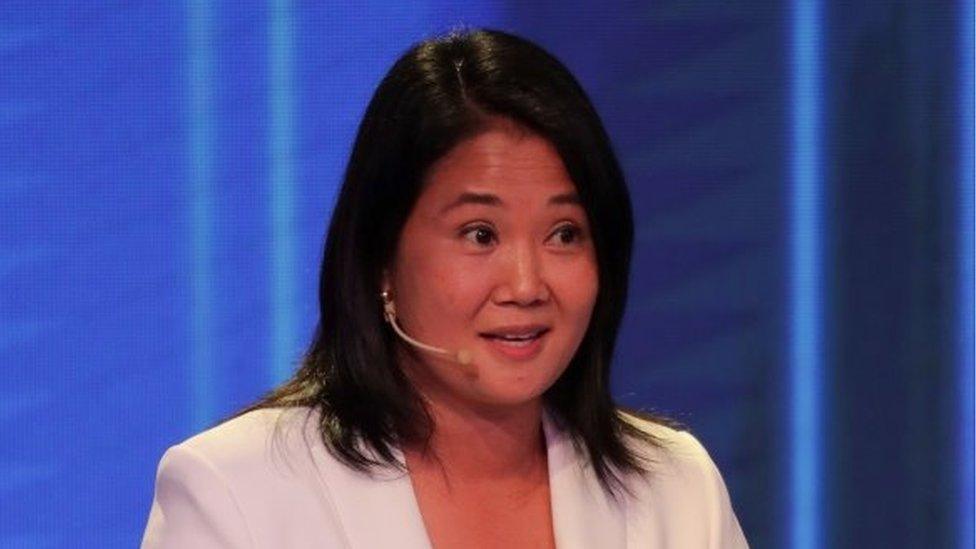
Keiko Fujimori has stood for president twice before
Like Mr Forsyth, Ms Fujimori says she will use Peru's mining income to boost the economy. She has also said that she will create two million jobs by expanding infrastructure and investing in health and education.
She was followed by Rafael López Aliaga, a 60-year-old Roman Catholic businessman who goes by the nickname "Porky", standing for the Popular Renewal party.
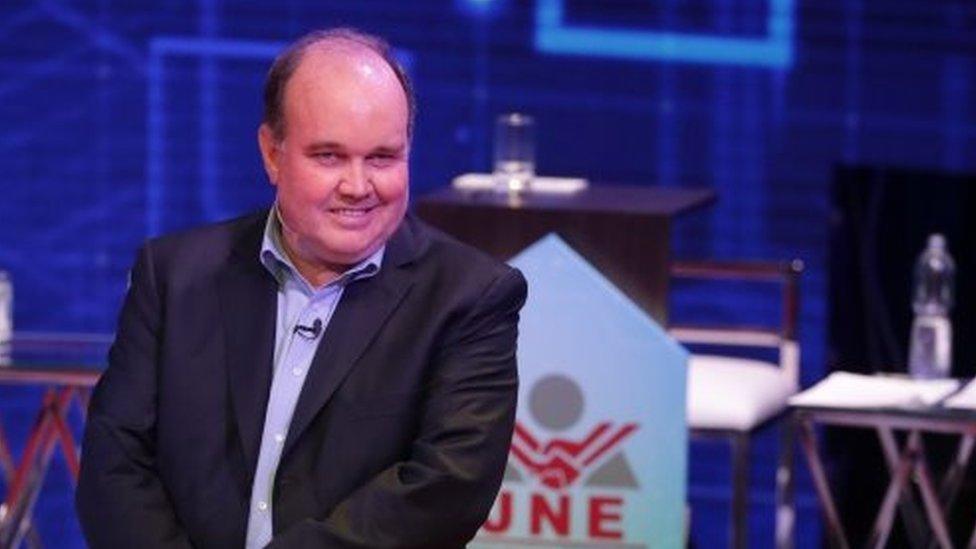
Rafael López Aliaga has embraced his Loony Tunes nickname
Mr López Aliaga, a member of the Catholic organisation Opus Dei, practises celibacy, opposes abortion and gay marriage and says he wears sackcloth to keep his desires under control.
Pandemic looms over vote
Peruvian voters have told pollsters that they think the next government should prioritise the fight against the Covid-19 pandemic, as well as combating crime, promoting employment and investment.
Peru has been the country in South America with the highest number of Covid-19 deaths per capita, according to Johns Hopkins University figures. Its economy has also felt the impact of the pandemic, contracting by 11% in 2020 and more than 2.2 million people have lost their jobs.
The arrival of more than a million Venezuelans who have fled the political and economic turmoil in their homeland has also featured in the campaign of some of the candidates. Hernando de Soto was one of those picking up on the issue, saying he would strengthen Peru's borders to prevent the entry of "foreign criminals."
Voters have become even more jaded by corruption scandals and the so-called "vaccinegate", the revelation in February that previous and current government officials secretly got vaccinated early against Covid-19.
Related topics
- Published17 February 2021
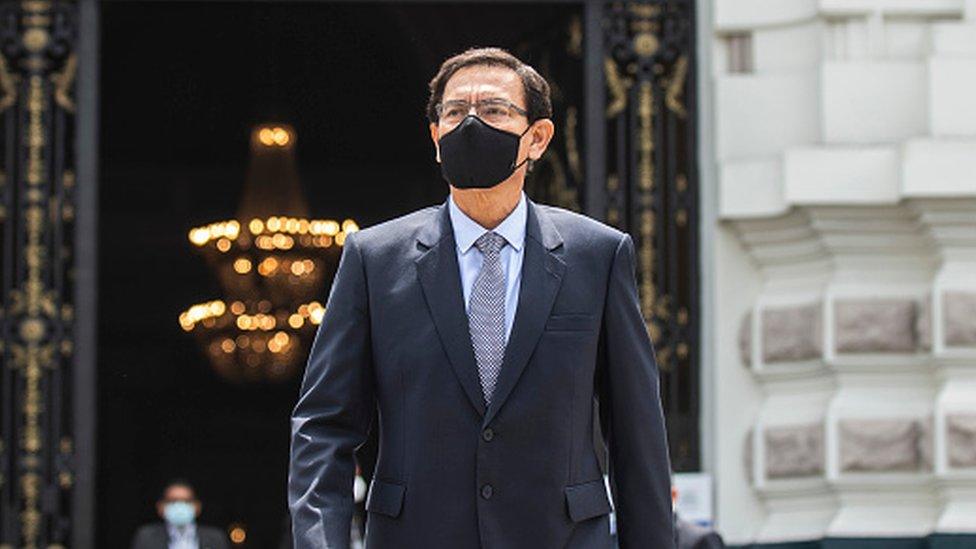
- Published18 November 2020
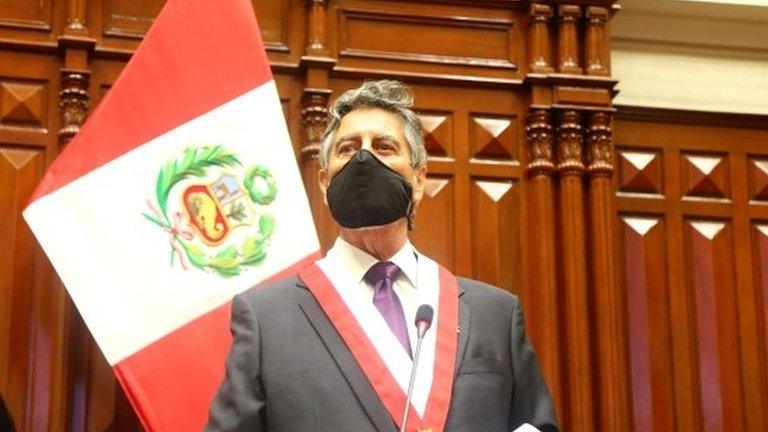
- Published12 September 2020
